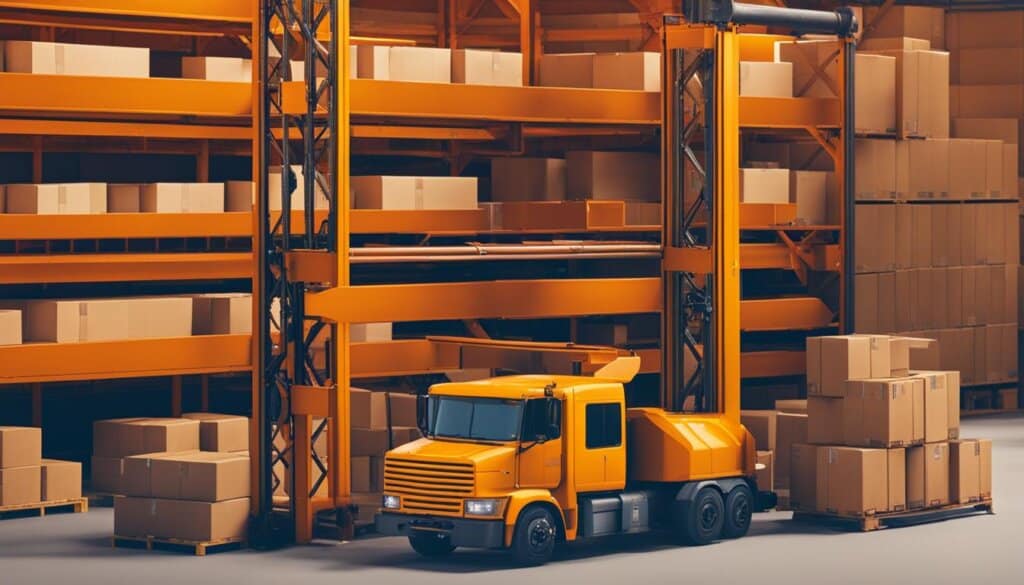Table of Contents
A distributor is an intermediary entity in the supply chain that operates between a manufacturer and a downstream entity, such as a retailer or value-added reseller. They play a crucial role in bridging the gap between the upstream and downstream entities, facilitating the distribution process. Distributors work with multiple manufacturers and serve as agents to sell their products to retailers, VARs, or wholesalers.
The Difference Between a Distributor and a Wholesaler
While distributors and wholesalers both play important roles in the supply chain, they have distinct differences in terms of the services they provide. Distributors, with their complex responsibilities, actively facilitate the movement of products from manufacturers to downstream entities, such as retailers. On the other hand, wholesalers primarily focus on purchasing products in large quantities and selling them at a profit.
Distributors take on an active role in the supply chain, acting as intermediaries between manufacturers and retailers. They provide a range of services and take responsibility for various tasks, including payment handling and procurement. Their involvement goes beyond simply buying and selling products, making their role more complex compared to that of wholesalers.
Wholesalers, on the other hand, specialize in buying products in bulk quantities and selling them to retailers or other businesses. They focus primarily on the transactional aspect of the supply chain and are not as involved in other services or responsibilities.
Key Differences Between Distributors and Wholesalers:
- Distributors actively facilitate the movement of products, while wholesalers focus on buying and selling in bulk.
- Distributors have complex responsibilities and a more active role in the supply chain, including payment handling and procurement. Wholesalers primarily focus on the transactional aspect.
- Distributors provide a wider range of services and act as intermediaries between manufacturers and downstream entities, such as retailers. Wholesalers predominantly focus on the buying and selling process.
Understanding the distinctions between distributors and wholesalers is crucial for businesses to effectively navigate the supply chain. Depending on the specific requirements of a company, choosing the right partner, whether it be a distributor or a wholesaler, can greatly impact the efficiency and success of the distribution process.
Next, we will delve deeper into the functions and role of distributors, further exploring the value they bring to the supply chain.
Functions and Role of a Distributor
Distributors are essential intermediaries in the supply chain, performing various functions and playing a vital role in the efficient delivery of products. Their proactive approach and value-added services contribute to the growth and adaptation of businesses.
One of the key functions of a distributor is to facilitate product delivery from the manufacturer to downstream entities, such as retailers and value-added resellers. They ensure a smooth flow of goods, ensuring timely availability and reducing lead times. This intermediary role helps manufacturers focus on production while relying on distributors for product distribution.
In addition to product delivery, distributors also take a proactive approach in educating resellers about new products. They provide presales training, marketing support, and valuable insights, enabling resellers to effectively promote and sell the products to end customers. By equipping resellers with the necessary knowledge and tools, distributors play a crucial role in driving sales and market penetration.
Distributors also offer value-added services, enhancing their role as intermediaries. They often provide product warranties, aftersales support, and technical assistance, ensuring customer satisfaction and building customer loyalty. These value-added services differentiate distributors from other entities in the supply chain, making them indispensable partners in the distribution process.
Moreover, distributors handle procurement activities, acting as a link between the manufacturer and the market. They analyze market demands, forecast sales, and make strategic purchasing decisions to ensure adequate inventory levels. By effectively managing procurement, distributors optimize the supply chain, contributing to cost savings and improved customer service.
In summary, the functions and role of a distributor extend beyond product delivery. They actively engage in educating resellers, provide valuable support and services, and serve as a crucial link in the supply chain. By performing these functions and adding value to the distribution process, distributors play a significant role in the success and growth of businesses.
| Functions of a Distributor | Role of a Distributor |
|---|---|
| Facilitate product delivery | Act as an intermediary |
| Educate resellers | Provide presales training and marketing support |
| Offer value-added services | Provide product warranties and aftersales support |
| Handle procurement activities | Link between the manufacturer and the market |
Image:

Types of Distributors
When it comes to distribution models, there are several types of distributors that cater to different markets and business transactions. Each type plays a unique role in the supply chain and provides value-added services to manufacturers and retailers. Let’s explore the different types of distributors:
1. Wholesale Distributors
Wholesale distributors are an essential part of the B2B model. They purchase goods in large quantities from manufacturers and sell them in smaller lots to retailers. These distributors act as intermediaries, connecting manufacturers with a network of retailers. By buying in bulk and distributing to multiple retailers, they help manufacturers expand their market reach and cater to a diverse customer base. Wholesale distributors often provide additional services such as warehousing, inventory management, and transportation.
2. Retail Distributors
Retail distributors engage in direct business transactions with end consumers. They sell products directly to the final buyers, whether purchased from manufacturers or wholesalers. Retail distributors are typically involved in the B2C model and operate physical stores or online platforms to reach their customers. They play a crucial role in the distribution process by offering convenience and accessibility to consumers. Retail distributors focus on understanding consumer preferences and provide personalized shopping experiences.
3. Online Distributors
With the rise of e-commerce, online distributors have emerged as a key player in the distribution landscape. These distributors operate solely through online platforms, selling goods or services over the internet. They leverage technology to streamline the purchasing process and provide a wider geographic reach to both manufacturers and consumers. Online distributors offer convenience, 24/7 availability, and often provide additional services such as drop shipping, order tracking, and customer support. Their e-commerce model enables seamless transactions and offers a diverse range of products.
| Type of Distributor | Description |
|---|---|
| Wholesale Distributors | Purchase goods in bulk from manufacturers and sell them in smaller lots to retailers. Operate in the B2B model and provide services such as warehousing and transportation. |
| Retail Distributors | Engage in direct business transactions with end consumers. Sell products purchased from manufacturers or wholesalers. Operate physical stores or online platforms. |
| Online Distributors | Operate solely through online platforms. Sell goods or services over the internet. Provide convenience, wider geographic reach, and additional services like drop shipping and customer support. |
Each type of distributor brings its own advantages and serves a specific purpose in the distribution ecosystem. Manufacturers and retailers rely on the expertise and services provided by distributors to effectively reach their target markets and serve their customers. By understanding the different types of distributors, businesses can make informed decisions when choosing their distribution partners to optimize their operations and enhance customer satisfaction.
Distributors in Financial Product Distribution
Distributors play a significant role in the distribution of financial products and services. They act as intermediaries that facilitate the distribution process of various financial products such as insurance policies, mutual funds, credit cards, and loans. These financial products are essential for individuals and businesses to manage their finances effectively and achieve their financial goals.
“Distributors help extend the reach of financial institutions and interact directly with customers, offering them a wide range of financial products and services. They play a crucial role in recommending appropriate financial solutions based on customers’ needs and requirements. This enables individuals and businesses to make informed decisions that align with their financial objectives.”
Financial distributors can take various forms, including institutions such as banks and non-banking finance companies, as well as individuals like brokers and agents. Banks and non-banking finance companies have established networks and resources to distribute financial products on a large scale, providing accessibility and convenience to customers. On the other hand, individual distributors like brokers and agents offer personalized services to cater to the specific financial needs of clients.
Financial products are distributed through different channels, including physical branches, online platforms, and third-party distribution networks. This diverse distribution network ensures that customers can access financial products and services through various convenient channels, meeting their preferences and requirements.
To illustrate the significant role that distributors play in financial product distribution, consider the following table:
| Types of Financial Products | Main Distributors |
|---|---|
| Insurance Policies | Insurance companies, banks, insurance brokers, agents |
| Mutual Funds | Asset management companies, banks, financial advisors |
| Credit Cards | Banks, credit card companies, retailers |
| Loans | Banks, non-banking finance companies, credit unions |
Distributors act as the bridge between financial institutions and customers, ensuring efficient product distribution and enhancing customers’ financial well-being. They provide valuable guidance and assistance in selecting the most suitable financial products and services, contributing to economic growth and financial stability.
Challenges and Risks for Distributors
Distributors face numerous challenges and risks in their day-to-day operations. One of the primary challenges is the fierce market competition they encounter. With the emergence of new distribution channels and manufacturers adopting direct selling strategies, distributors must constantly find innovative ways to stay ahead and maintain a competitive edge.
Inventory management poses another critical challenge for distributors. They must strike the delicate balance of keeping sufficient stock to meet customer demand while minimizing inventory costs. A proactive approach to inventory management is vital to avoid stockouts or overstocking, which can lead to significant financial losses and missed opportunities.
Effective supply chain management is essential for distributors to ensure a smooth flow of goods and streamline operations. It involves coordinating with multiple stakeholders, such as manufacturers, retailers, and transportation providers, to optimize processes and deliver products promptly. By implementing robust supply chain management strategies, distributors can improve cost savings, enhance customer service, and mitigate potential disruptions.
To overcome these challenges and mitigate risks, distributors need to adapt to market dynamics, employ advanced technologies for inventory forecasting and tracking, and foster strong relationships with their supply chain partners. By effectively managing these challenges, distributors can thrive in a competitive marketplace and continue to play a vital role as indispensable partners in the business ecosystem.
FAQ
What is a distributor?
A distributor is an intermediary entity that operates between a manufacturer and a downstream entity, such as a retailer or value-added reseller, in the supply chain. They bridge the gap between the upstream and downstream entities while providing important services to facilitate the distribution process.
What is the difference between a distributor and a wholesaler?
Distributors play a pivotal role in moving products from the manufacturer to downstream entities, such as retailers. They have more complex responsibilities and take on a more active role with both manufacturers and retailers, including handling payment and procurement. On the other hand, wholesalers primarily focus on buying products in large quantities and selling them at a profit.
What are the functions and role of a distributor?
Distributors perform various functions and play a vital role as intermediaries in the supply chain. They facilitate product delivery from the manufacturer to downstream entities, ensuring a smooth flow of goods. Distributors often take a proactive approach in educating resellers about new products and provide services such as presales training, marketing, and product warranties. They also handle procurement and serve as a link between the manufacturer and the market, contributing to growth and adaptation.
What are the different types of distributors?
There are different types of distributors that cater to various markets and distribution models. Wholesale distributors purchase goods in large quantities from manufacturers and sell them in smaller lots to retailers. They operate predominantly in the B2B model, connecting manufacturers with a network of retailers. Retail distributors, on the other hand, engage in direct business transactions with final consumers, selling products purchased from manufacturers or wholesalers. Online distributors operate on an e-commerce model and sell goods or services over the Internet, providing convenience and greater geographic reach.
How do distributors play a role in financial product distribution?
Distributors play a significant role in the distribution of financial products and services. They facilitate the distribution of various financial products like insurance policies, mutual funds, credit cards, and loans. Financial distributors can be institutions such as banks or non-banking finance companies, as well as individuals like brokers and agents. They help extend the reach of financial institutions, interact directly with customers, and recommend suitable financial products or services, contributing to economic growth.
What are the challenges and risks faced by distributors?
Distributors face several challenges and risks in their operations. Market competition is a primary challenge, with the emergence of new distribution channels and direct selling by manufacturers. Inventory management is also a critical challenge, as distributors need to balance maintaining sufficient inventory with minimizing costs. Effective supply chain management is essential for distributors to ensure a smooth flow of goods and provide cost savings and improved customer service. By managing these challenges, distributors can maintain their competitive advantage as indispensable partners in the business ecosystem.







